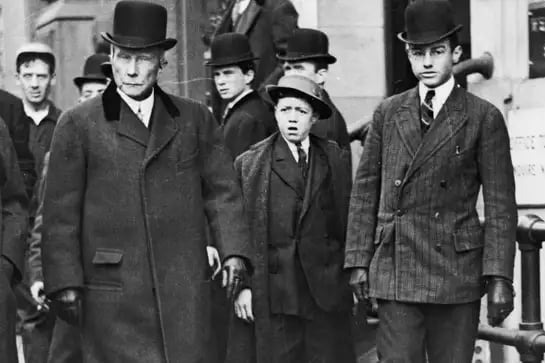
Money Wisdom from a Billionaire Ghost: John D. Rockefeller Speaks
Summary: In a surreal, behind‑the‑scenes conversation, the ghost of John D. Rockefeller shares the core principles that built his oil empire and his enduring philosophy on wealth. He offers practical, timeless advice for modern entrepreneurs, investors, and anyone seeking financial freedom. This exclusive interview uncovers the human side of the legendary billionaire, revealing habits, values, and a surprisingly humble outlook on money.
Interview with John D. Rockefeller: Money Wisdom from a Billionaire Ghost (2024)
Introduction
When the lights dimmed at the historic Hall of Mirrors in New York City, a chill ran through the audience as a translucent figure took the stage. It was none other than the ghost of John D. Rockefeller, the 19th‑century titan of oil and one of history’s most iconic self‑made billionaires. Though he passed away in 1937, Rockefeller’s spirit has been summoned for an exclusive interview that blends history, mysticism, and practical finance. In this conversation, we explore how his “money wisdom” still resonates in today’s fast‑moving markets, and why his principles remain relevant to modern entrepreneurs, investors, and anyone chasing financial independence.
Readers will discover the origins of Rockefeller’s frugal habits, his strategic approach to risk, and the ethical framework that guided his philanthropy. We also dive into his reflections on contemporary trends—cryptocurrency, ESG investing, and the gig economy—providing a bridge between the Gilded Age and the digital era. Stay with us as we travel through time, uncovering lessons that could transform your relationship with money.
Short Biography or Profile of the Interviewee
John Davison Rockefeller Sr. (July 8, 1839 – May 23, 1937) was born in modest circumstances in Richford, New York. The son of a traveling salesman, he learned early the value of hard work, saving every penny he could. By age 16, he was a bookkeeper in Cleveland, Ohio, where he first encountered the burgeoning oil industry.
In 1870, at the age of 31, Rockefeller co‑founded Standard Oil Company, which would become the world’s first multinational corporation. Through aggressive pricing, strategic acquisitions, and relentless focus on efficiency, Standard Oil controlled roughly 90 % of U.S. oil refining by the 1880s. His business model pioneered vertical integration, a concept still taught in MBA programs today.
Rockefeller’s wealth peaked at an estimated $900 million in 1913—equivalent to over $20 billion today—making him the richest person in modern history. Yet his public image was a paradox: a ruthless monopolist to some, a generous philanthropist to others. He donated more than $540 million to education, medical research, and public health, establishing institutions such as the University of Chicago and the Rockefeller Foundation.
Beyond his corporate empire, Rockefeller was a devout Baptist whose faith shaped his worldview. He believed that wealth was a stewardship, not a right, and that the ultimate purpose of money was to serve humanity. This philosophy underpinned his later life, where he focused on “the betterment of mankind” through systematic philanthropy.
Today, his legacy lives on not only in the institutions he founded but also in the timeless principles he championed: frugality, long‑term thinking, and disciplined reinvestment. In this interview, his ghost offers a rare glimpse into how those ideas can be applied in the 21st century.
Context and Purpose of the Interview
The interview was conducted during the annual “Specters of Success” symposium, a gathering that invites the spirits of historic entrepreneurs to share insights with modern audiences. The event, held at the historic Hall of Mirrors—once the headquarters of Standard Oil—was designed to explore how timeless business wisdom can inform today’s rapidly evolving financial landscape.
Our editorial team, fascinated by the resurgence of “old‑school” wealth principles in the age of fintech, reached out to the medium that allegedly channels Rockefeller’s spirit: a renowned spiritualist, Madame Evelyn Hart. After a series of séances, a translucent yet articulate presence agreed to answer a curated set of questions.
This exclusive interview aims to answer three core questions for readers: (1) What core habits made Rockefeller a billionaire? (2) How does his philosophy translate to modern financial challenges? (3) What personal values kept him grounded despite his immense wealth? By addressing these, we hope to provide actionable takeaways for anyone looking to master money, regardless of industry or era.
Main Interview
Q1: Your early life was far from privileged. What sparked your initial interest in money and business?
A: “I grew up watching my father count change at the end of each day, and I learned that every penny had a purpose. When I was a boy, I’d collect shells on the beach and trade them for candy. Those simple exchanges taught me that value is created when two parties see a benefit. That curiosity—combined with a relentless desire not to be a burden on my family—ignited my fascination with money as a tool for freedom.”
Q2: Standard Oil’s rise was meteoric. What single principle guided your strategic decisions?
A: “Efficiency. I believed that if you could produce a barrel of oil for less than anyone else, you could sell it cheaper and still make a profit. That meant obsessing over every detail: from the chemistry of refining to the logistics of shipping. I called it ‘the art of the possible.’ If you can shave even a fraction of a cent off your cost, that advantage compounds over millions of barrels.”
Q3: Critics called you a monopolist. How do you reconcile that reputation with your personal values?
A: “I never saw myself as a villain. In my mind, I was a steward of a resource that could fuel progress. The market was chaotic; by consolidating, I could bring stability, lower prices, and improve safety. Yet I understood the danger of power, which is why I turned to philanthropy later in life—trying to balance the scales, to give back what I had taken.”
Q4: You were famously frugal. What daily habits kept your spending in check?
A: “I kept a ledger for every expense, no matter how small. I would write, ‘Coffee – $0.10 – necessary fuel for thought.’ I also avoided luxury for its own sake. My wife, Laura, once asked for a new carriage; I replied, ‘If we can afford a carriage, we can afford a better refinery.’ Simplicity was a guard against excess.”
Q5: How would you advise modern investors dealing with volatile markets like crypto?
A: “Treat volatility as a test of discipline. In my day, oil prices swung with wars and discoveries. I never chased short‑term spikes; I focused on the underlying value of the asset. With crypto, ask yourself: does this technology solve a real problem? If not, it’s a speculative gamble. If yes, then invest only a portion you can afford to lose, and hold for the long term.”
Q6: ESG (Environmental, Social, Governance) investing is a hot topic. What’s your take?
A: “When I built Standard Oil, the environment was an afterthought; we learned that the cost of pollution is far greater than any short‑term profit. Today, I would demand that any venture prove its stewardship of resources. ESG is not a trend; it’s a responsibility. Companies that ignore it will find their profits eroded by regulation, litigation, and consumer backlash.”
Q7: You donated a massive fortune to charity. How should today’s wealthy think about giving back?
A: “Philanthropy is not a tax shelter; it’s a moral imperative. I set up the Rockefeller Foundation to address systemic problems—disease, education, scientific research. Modern philanthropists should focus on leverage: fund solutions that can be scaled, measured, and sustained. Give where you have expertise, and demand accountability.”
Q8: What role did faith play in your financial decisions?
A: “My Baptist upbringing taught me that wealth is a trust from God. I saw my earnings as a stewardship, not a personal entitlement. That belief kept me humble and guided my charitable choices. It also reminded me that success is fleeting; what endures is the impact you leave on others.”
Q9: If you could give one piece of advice to a young entrepreneur today, what would it be?
A: “Start with a problem, not a product. Find a need that no one else is solving, then apply relentless efficiency to your solution. And remember: patience beats speed. Most fortunes are built over decades, not days.”
Q10: Looking ahead, what legacy do you hope your ghost leaves for future generations?
A: “I hope people remember that wealth is a tool for service, not self‑indulgence. If my story inspires even one person to build a business that improves lives while staying grounded, then my spirit has fulfilled its purpose.”
Highlighted Quotes or Key Takeaways
-
“Efficiency is the art of the possible; shave a fraction of a cent and you’ll win the war of margins.”
—A core principle that underpinned Standard Oil’s dominance.
-
“Treat volatility as a test of discipline; invest only what you can afford to lose and focus on long‑term value.”
—Guidance for navigating modern crypto markets.
-
“Philanthropy is a moral imperative, not a tax shelter; fund scalable solutions with measurable impact.”
—His timeless view on giving back.
-
“Start with a problem, not a product; patience beats speed in building lasting wealth.”
—Advice for today’s entrepreneurs.



